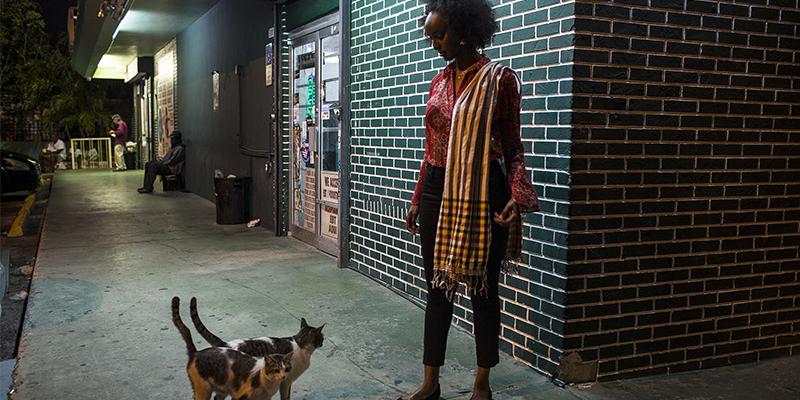Readers can discover Ladan Osman’s works in her two books, The Kitchen-Dweller’s Testimony and Ordinary Heaven; her words will challenge you to consider and reconsider our humanity and to sit, sometimes uncomfortably, in the midst of questions not often asked. Her poetry is moving all on its own, but after speaking with Osman, if only via email, it’s obvious that hearing her poems come to life through her (literal) voice will make them even more riveting. Described as the sleeper in this year’s LitFest lineup, Osman is definitely an author whose reading you’ll want to experience for yourself.
It’s clear that Osman has a special way with words, not only in writing but also in conversation. Despite how little time it took for her to respond to my interview questions, her answers were just as captivating and thought-provoking as her poetry, albeit in a different way.
Smile Politely: Considering that the majority of your poems are written from the perspective of a woman, how has this affected how you identify yourself or see your own gender?
Ladan Osman: Growing up, women were more likely to tell me their stories. That’s still true today. My poems are populated with their voices, their yearnings, their personal myths. I identify as a woman but consider gender through questions. What is a woman, actually, versus politically, or socially? In writing about myself, I better understood my relationships to other women and to men. While I recognize structure and culture, I don’t accept gender binaries. I don’t accept that men and women are incomprehensible to each other, or that we are all more different than we are alike.
SP: Do you see writing as a tool of empowerment, either for yourself or in general? If it does give power, what responsibility do writers then have to make the best use of that power?
Osman: Yes, I do. I feel most capable when I’m writing. I’m subject to what a narrative demands, or what the atmosphere or a poem requires but otherwise have more control on the page than I do in everyday life. In poems, I can slow down time; I can extract a preferred moment, walk around in a beloved’s heart, or alter memories or dreams. I can’t speak for other writers but I believe I have an obligation to share and teach with the access writing has given me, in a worldly sense, and from what it has taught me about being human.
SP: Many of your poems establish a sense of loneliness or lack of belonging. Did you feel this way in real life while you were writing? Has writing helped appease this loneliness?
Osman: Maybe I did feel that way while drafting those poems. It was challenging to feel estranged from my writing practice, and lonely while in an intimate relationship. I think my baseline state was productive melancholy. But I’m often surprised and pleased by what I see and hear. A good friend described me as a naive alien who is continuously stepping out of her spaceship for the first time. Sometimes this can seem lonely but I think many of us are lonely, are longing to connect first with ourselves, then with others. I’ve definitely thought if I worked and loved harder, I’d feel more settled in my decisions but I think this is part of what living is: experiencing unease and going about your business anyway. Writing gives me an opportunity to problem solve, to transform debilitation into lyric.
SP: How much of your writing is autobiographical or based off real experiences (of you, your family, friends, acquaintances)?
Osman: All my writing is true but isn’t exactly real. Most of what I write is loosely based off things I’ve experienced in waking life or in dreams. I don’t share many accurate details about the people in my life but often try to translate the tones of their stories into poems.
SP: In your poem “Amber Doll” you starkly contrast the innocence associated with a childhood doll against extremely vivid images of violence. Why did you choose to go about it in this way?
Osman: In part, the doll represents the menace of memory, or attempted subjugation due to gender and poverty. I was uncomfortable with what remained unresolved in my speaker, so I allowed the last section of my book to move more freely. I wanted to give my speaker an opportunity to eliminate all the phantoms pursuing her, and this doll figure worked to recall other childhood objects in the book. I think we all need to lay things down, and sometimes that process is sloppy and disturbing.
SP: You’ve said in a previous interview that you’re never really writing for yourself or by yourself. Can you elaborate on this statement?
Osman: I often write thinking about people in my family who haven’t had the same educational opportunities I’ve had. A huge part of the world population faces instability due to war and other devastating factors. What does it mean to be a young woman, who is free to work and rest without any real difficulty? I have a responsibility to keep this great favor in mind, and write the things my family and strangers urge me to share. They tell me about their imposed limitations but also about visions for their freedom. I want to honor the fact that people ask me to remember and document their fullest desires.
———
Osman will be reading her poetry on Thursday, September 24th from 8-8:30 p.m. at Cafeteria & Company (208 W. Main St., Urbana), no cover. You can see the rest of the lineup and schedule here.
Editor’s Note: Photos have been removed from this article since the time of publishing.
Top photo by Joe Penney








